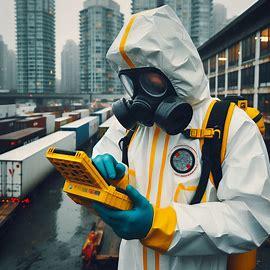Is Your Home a Haven or a Hazard? Unveiling the Importance of Asbestos Testing

Our homes are sanctuaries. Places of comfort, relaxation, and refuge. But what if a silent danger lurked beneath the surface, transforming your haven into a potential health hazard? Asbestos, a once-celebrated building material, can pose a serious threat if left undetected. This is where asbestos testing emerges as a crucial first step, empowering you to safeguard your home and your loved ones.
A Legacy of the Past: The Potential Threat of Asbestos
Asbestos fibers, microscopic and invisible to the naked eye, were commonly used in building materials prior to the late 1980s. When disturbed during renovations or demolition, these fibers can become airborne and inhaled. Unfortunately, inhaling asbestos fibers can lead to a range of respiratory illnesses, including the aggressive lung cancer mesothelioma. With countless homes built before the asbestos ban potentially containing these materials, asbestos testing becomes vital in uncovering this hidden legacy and ensuring the safety of your home environment.
Peace of Mind Through Proactive Measures
Living with the unknown about potential health hazards can be anxiety-provoking. Asbestos testing offers a proactive solution, replacing uncertainty with peace of mind. Certified asbestos inspectors possess the expertise to identify suspect materials and safely collect samples for laboratory analysis. Their meticulous procedures minimize disruption to your daily life while prioritizing the well-being of your family.
When to Consider Asbestos Testing
Several situations call for this essential safety measure:
- Planned Renovations or Demolition: If you're planning renovations or demolition on a pre-late 1980s building, asbestos testing is often mandatory by law to ensure worker and occupant safety.
- Visible Signs of Deterioration: Damaged or crumbling insulation, textured paint or popcorn ceilings applied before the 1980s, and vinyl flooring from the same era all warrant asbestos testing due to their potential asbestos content.
- Unclear Renovation History: If you're unsure about the materials used in past renovations, asbestos testing can provide much-needed clarity and peace of mind.
Tailored Solutions: A Spectrum of Testing Options
Asbestos testing isn't a one-size-fits-all solution. Different testing options are available to address your specific concerns:
- Bulk Material Sampling: This involves collecting samples of suspect materials for laboratory analysis to confirm the presence of asbestos.
- Airborne Fiber Testing: This assesses the concentration of asbestos fibers in the air, often conducted before, during, and after asbestos abatement projects.
- Soil Testing: If you suspect asbestos-containing materials have been dumped on your property, soil testing can uncover hidden dangers.
- Water Analysis: While less common, asbestos fibers can sometimes become lodged in water systems. Water analysis can determine if asbestos is present in your drinking water.
Empowerment Through Knowledge: Taking Control of Your Home's Health
The results of asbestos testing equip you with the knowledge to make informed decisions about your home's future. Depending on the findings, various options might exist, including asbestos abatement (removal) or management plans to safely contain the materials.
Investing in a Healthy Future for Your Home
While the upfront cost of asbestos testing might seem like a burden, it's a wise investment in the long-term health and well-being of your home and its inhabitants. Early detection and proper management of asbestos-containing materials can significantly reduce the risk of asbestos-related diseases, allowing you to transform your home back into a true haven for years to come. Asbestos testing is a proactive step towards a healthier and safer living environment for you and your loved ones.
- Art
- Causes
- Crafts
- Dance
- Drinks
- Film
- Fitness
- Food
- الألعاب
- Gardening
- Health
- الرئيسية
- Literature
- Music
- Networking
- أخرى
- Party
- Religion
- Shopping
- Sports
- Theater
- Wellness
- IT, Cloud, Software and Technology


